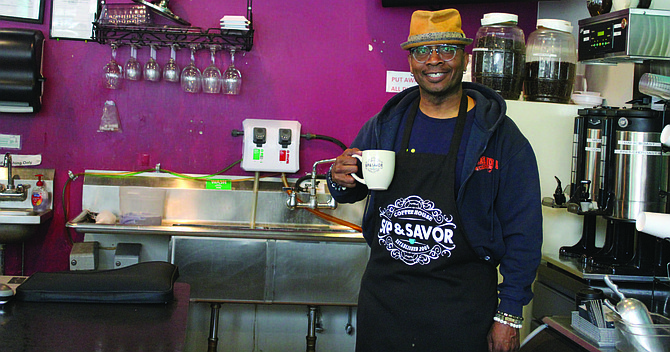CITY OF CHICAGO HELPING SMALL BUSINESSES STAY AFLOAT WITH COVID-19 LOANS
City of Chicago Helping Small Businesses Stay Afloat With COVID-19 Loans
BY WENDELL HUTSON
Contributing Writer
An Englewood entrepreneur with three, South Side coffee shops including one in Hyde Park, was among the first recipients to receive a low-interest loan from the $100 million Chicago Small Business Resiliency Fund.
The Sip & Savor, which is owned by Trez Pugh III, received a $50,000 loan from the resiliency fund that will be used to pay employees.
“Before the coronavirus hit, I had 19 employees, but now I am down to six with some working a few hours here and there, but most receiving unemployment,” explained Pugh. “Payroll is 50 percent of cost for small businesses, so that is what I plan to use this grant for as well as operating and marketing expenses. This loan means that my employees that might have been laid off, will now keep their jobs.”
He also received a $2,500 grant from the University of Chicago, which announced this month it would award $680,000 in grants ($2,500 to $7,500) to small businesses in Douglas, Grand Boulevard, Greater Grand Crossing, Hyde Park, Kenwood, Oakland, South Shore, Washington Park, and Woodlawn. Sip & Savor has two Bronzeville locations at 528 E. 43rd St. and 78 E. 47th St. and one in Hyde Park, 5301 S. Hyde Park Blvd.
And despite the current stay-at-home order issued by Gov. JB Pritzker, which has crippled most small businesses, Pugh, a retired federal employee, said he has no plans to close either location, even if it means using his personal funds.
“I have changed the store hours and will continue making adjustments until things get back to normal, but all three locations will remain open,” contends Pugh. “Without the loan from the resiliency fund, I probably would have started running up credit cards or dipping into my retirement to keep things moving along. So this loan was a big help.”
Coronavirus also known as COVID-19 (coronavirus disease of 2019) is the name of the disease caused by the SARS-CoV-2 virus and it was originated in Wuhan, China in late 2019, according to the World Health Organization, which said it has now affected more than 1 million people. And symptoms include fever, cough, shortness of breath and breathing difficulties. The period within which symptoms would appear is two to 14 days.
“Its [COVID-19’s] impact on our small businesses has cost the livelihoods of thousands of Chicagoans and threatens the very fabric of our communities,” said Mayor Lori Lightfoot. “The Chicago Small Business Resiliency Fund offers our local, family businesses and entrepreneurs a critical lifeline during this unprecedented moment of economic hardship and uncertainty.”
According to Rosa Escareno, commissioner for the city’s Department of Business Affairs and Consumer Protection, the resiliency fund (chicagoresiliencyfund.com) so far has approved 124 loans to a diverse pool of applicants with blacks and Latinos accounting for 41 percent. Each business receiving loans, employs fewer than 50 employees and suffered more than a 25 percent drop in revenue due to the COVID-19 outbreak.
“The Chicago Small Business Resiliency Loan Fund is working to put millions of dollars into the hands of small business owners during these challenging times,” said Escareno. “[And] we are taking important critical steps to help our small businesses pay rent, meet payroll and satisfy other urgent operational needs in order to stay afloat during this time.”
The city also created a Small Business Navigator program where 10 organizations, such as the South Shore Chamber of Commerce and the South East Chicago Commission in Hyde Park, will assist businesses with applying for loans. Each participating organization received a $10,000 grant from the city.
“Essentially, we are the liaison between the city of Chicago and small businesses,” said Tonya Trice, executive director of the South Shore Chamber of Commerce. “So, if a business needs help filling out an application for the resiliency fund, we can help with that.”
And unlike the federal Paycheck Protection Program, which provides forgivable loans to small businesses, loans made by the resiliency fund must be repaid.
“Having a loan is not necessarily the worse thing in the world because it can help you grow your business,” added Trice.
While not chosen for the Navigator Program, the Chatham Business Association has also been active in helping businesses access COVID-19 relief funds, said Melinda Kelly, president of the CBA.
Latest Stories
- Comcast Launches NOW – a New Brand and Product Portfolio that Redefines Low-Cost Internet, Mobile, and TV
- Wards365 Announces Summer50 Fest on Saturday, May 18 at United Center City-Wide Resource Festival focused on Summer Activities for Youth and Families
- The Magic Of Alvin Ailey Comes To The Auditorium Theater
- BOSS Impact Funds Gives Black Women Entrepreneurs Access To Capital
- Closing the Black Maternal Health Gap Is At The Center Of Organization’s Work
- Praize Productions’ Production Shows That ‘Black Love Reigns Supreme’
- Chicago Public Schools Announces 2024-25 Preschool Application Launch
- State Treasurer Michael Frerichs Pushes to Reunite Residents with Unclaimed Property, Missing Money
- Gov. Pritzker Announces New Illinois Grocery Initiative Grant Opportunity
- MAYOR JOHNSON ANNOUNCES NEW APPOINTMENTS TO CITY COLLEGES OF CHICAGO BOARD OF TRUSTEES
Latest Podcast
Sydney Blaylock-The local skater with national experience

